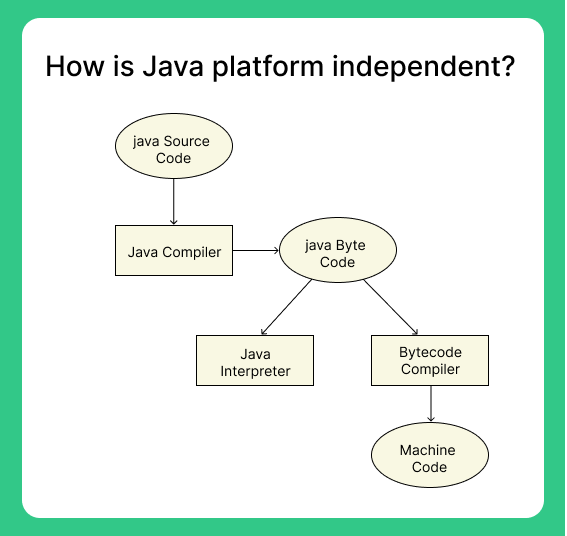How is Java a platform independent language?
How is Java a Platform Independent Language?
In the realm of software development, Java stands tall as a platform-independent programming language. Its unparalleled versatility and reliability make it a cornerstone of the industry.
In this article, we delve deep into the intricacies of why Java is considered a platform-independent language

Exploring Java Platform Independence
Platform independence means that java compiled code (byte code) can run on any operating system.
A programme is written in a language that is readable by humans. It may contain words, phrases, or other content that the machine does not understand. To be understood by the machine, the source code must be written in a machine-readable language, typically a machine-level language. As a result, a compiler is required. The compiler converts the high-level language (human language) into a machine-readable format. As a result, a compiler is a programme that converts source code from a programming language into executable code.
This executable code may be a sequence of machine instructions that can be executed by the CPU directly, or it may be an intermediate representation that is interpreted by a virtual machine. This intermediate representation in Java is the Java Byte Code.
Step by step Execution of Java Program:
- Whenever, a program is written in JAVA, the javac compiles it.
- The result of the JAVA compiler is the .class file or the bytecode and not the machine native code (unlike C compiler).
- The bytecode generated is a non-executable code and needs an interpreter to execute on a machine. This interpreter is the JVM and thus the Bytecode is executed by the JVM.
- And finally program runs to give the desired output.

What is Platform Independence?
Platform independence, often referred to as “write once, run anywhere” (WORA), is a fundamental concept in Java programming. It means that Java code can be written on one platform (e.g., Windows) and executed on another (e.g., Linux) without modification. This remarkable capability is achieved through the Java Virtual Machine (JVM), which acts as an intermediary between the code and the underlying operating system.
The Role of the Java Virtual Machine (JVM)
To understand platform independence in Java, one must grasp the pivotal role played by the JVM. The JVM serves as an execution environment for Java applications, translating Java bytecode into machine-specific instructions. This abstraction layer shields developers from the intricacies of different operating systems, allowing Java applications to run seamlessly across various platforms.
How Java Achieves Platform Independence
Java’s platform independence is not a result of magic but rather a well-thought-out design. Here are the key mechanisms that make it possible:
- Compilation to Bytecode :
When you compile Java source code, it is transformed into bytecode. Bytecode is a platform-neutral representation of the code that can be executed on any system with a compatible JVM. This compilation step is the cornerstone of Java’s platform independence. - The Java Standard Library :
Java provides a comprehensive standard library that abstracts low-level system-specific operations. Developers can leverage these libraries to perform tasks like file I/O, networking, and user interface development without worrying about platform-specific details. - Classloaders :
Java’s classloading mechanism allows classes to be loaded dynamically at runtime. This flexibility enables Java applications to adapt to different environments by loading platform-specific implementations when necessary.
Java’s Platform-Independent Features
- Strongly Typed Language : Java is a statically typed language, which means that variables must be declared with a specific data type before use. This ensures type safety and portability across platforms. The compiler checks for type compatibility at compile-time, reducing the likelihood of runtime errors.
- Garbage Collection : Automatic memory management is another advantage of Java. The JVM includes a garbage collector that deallocates memory occupied by objects that are no longer in use. This feature not only enhances the stability of Java applications but also simplifies memory management, irrespective of the platform.
- Standard Library : Java boasts an extensive standard library that provides a wide range of pre-built classes and APIs. These libraries are platform-independent, allowing developers to leverage them consistently across different systems. Whether you’re working on file I/O, networking, or user interfaces, Java’s standard library has you covered.
- Cross-Platform GUI Development : Java’s Swing and JavaFX libraries empower developers to create graphical user interfaces (GUIs) that look and feel native on various platforms. This capability enables the development of cross-platform desktop applications with ease.
Java Class Libraries
Another key factor contributing to Java’s platform independence is its extensive collection of class libraries. These libraries provide pre-built, platform-independent functions and components that developers can leverage in their applications. Java’s Standard Library, part of the Java Development Kit (JDK), is a prime example of such libraries.
Advantages of Class Libraries
- Saves Development Time: By using Java class libraries, developers can save significant time in coding and testing common functionalities, allowing them to focus on the unique aspects of their projects.
- Enhances Portability: Class libraries are designed to be platform-independent, ensuring that applications built with them can run on diverse systems without modification.
- Maintains Consistency: Java’s class libraries offer a consistent and reliable set of tools and APIs, reducing the chances of compatibility issues across different platforms.
Conclusion
In conclusion, Java’s status as an independent language is well-earned. Its ability to run on various platforms, extensive standard library, security features, and impact on software development make it a valuable tool for developers worldwide.
Prime Course Trailer
Related Banners
Get PrepInsta Prime & get Access to all 200+ courses offered by PrepInsta in One Subscription
Get over 200+ course One Subscription
Courses like AI/ML, Cloud Computing, Ethical Hacking, C, C++, Java, Python, DSA (All Languages), Competitive Coding (All Languages), TCS, Infosys, Wipro, Amazon, DBMS, SQL and others




Login/Signup to comment